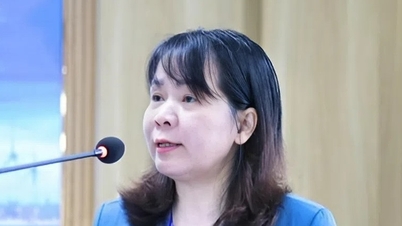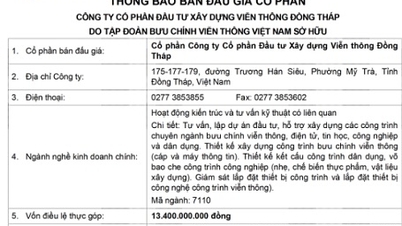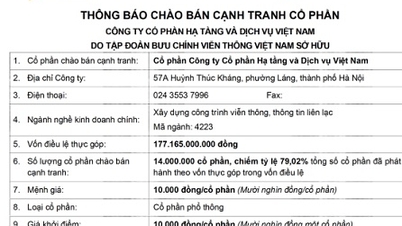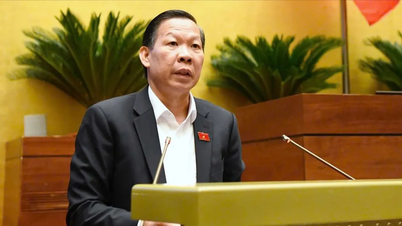On the morning of November 6, the seminar “Identifying and combating fake news in the AI era” organized by Tien Phong Newspaper in collaboration with Ho Chi Minh City University of Transport attracted nearly 1,000 students. The program warned of the risk of young people becoming victims of fake news, high-tech fraud and the legal consequences of sharing unverified information.
Fake news infiltrates, students easily become double victims
At the seminar, Captain Huynh Do Tan Thinh, Special Police Team of the Criminal Police Department - Ho Chi Minh City Police, warned students, especially new students, about common scams such as impersonating police, lecturers or government agencies to request information, online love scams and then threatening to post private photos, posting light jobs with high salaries to steal money or accounts, sending links containing malware to take over devices or taking advantage of the psychology of spreading information to spread false content, install malware and steal data.

Captain Thinh warns students to be wary of overly intimate messages from strangers.

Common scams targeting students
The most notable scenario is the “zero-dong shipper”. Students receive messages with free gifts, then are lured into video calls with “fake police”. They ask the victims to go to a private place, even forcing them to take off their clothes to “verify their bodies”. If the victims comply, the subjects record the clip, threaten to post it online, and demand hundreds of millions of dong in “investigation fees”.
There are cases where students are instructed to make fake videos of themselves being kidnapped, tied up, smeared with blood, and sent to their families to get money. In some cases, students are even lured into the role of “money transfer agents” - becoming intermediaries in a fraud ring, not knowing that they are aiding in the crime.
“In the past two years, not only students, but also parents have been manipulated. There was a mother sitting next to a real police officer but still believed the scammer on the phone,” the high-tech crime prevention expert added.
Technology is not scary, losing your cool is dangerous
Mr. Vo Do Thang, Director of Athena Cyber Security Center, said that scammers use AI to manipulate digital psychology, making victims afraid and lose control. He shared about a businessman who lost nearly 1 billion VND because his voice and image were simulated to defame his reputation and forced him to transfer ransom money.

“The scary thing is not technology but when people lose their composure,” Mr. Thang emphasized.
In the digital age, scams not only take money but also attack the emotions, honor and psychology of the victims. Fake news and AI-generated images can make many people panic and lose control, a form of psychological manipulation to undermine reputation and destroy careers. Therefore, it is necessary to know how to identify, stay calm and not stay silent when threatened.

Runner-up Cam Ly shared that she has many times encountered videos that look very real but are actually created using AI to scam people.
The event had the participation of Miss Universe Vietnam 2025 runner-up Do Cam Ly and Miss World Vietnam 2024 runner-up Vo Minh Toai sharing with students about how to use social networks safely and spread positive information.
Many young people admit to having been affected by fake news at least once and want to be equipped with skills to deal with it. Through the program, students clearly understand the consequences of sharing false information, from breaking the law to damaging their reputation and psychology.
4 steps to take when faced with fake news or technology scams
1. Stay calm - ask questions
When receiving strange information or unusual requests, do not react immediately. Ask again and check multiple times. This can easily cause the subject to reveal a loophole or automatically stop contacting.
2. Not following the request
If you are threatened or your personal information is being exposed, do not transfer money, send additional data, or move as directed. Try to buy time to stay calm and in control of the situation.
3. Notify relatives or authorities
Don't stay silent. Sharing helps break the psychological isolation that scammers want to maintain to control you.
4. Ask an expert when the case is complicated
If the situation is serious, contact a cybersecurity expert or specialist for immediate technical support. You are not alone in the fight against fake news and scams.
Source: https://nld.com.vn/gioi-tre-thanh-moi-ngon-cua-tin-gia-lua-dao-thoi-ai-196251106145902599.htm





![[Photo] Prime Minister Pham Minh Chinh receives the delegation of the Semiconductor Manufacturing International (SEMI)](https://vphoto.vietnam.vn/thumb/1200x675/vietnam/resource/IMAGE/2025/11/06/1762434628831_dsc-0219-jpg.webp)





































































































Comment (0)